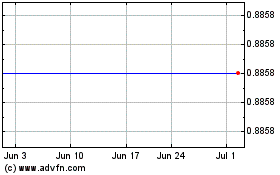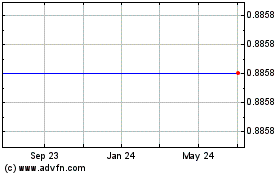ProShares, US Commodity Funds Move to Fill Gap for Oil Bets
December 05 2016 - 6:04PM
Dow Jones News
By Asjylyn Loder
With just days left to bet on oil prices using two of the most
popular and controversial products on the market, competing
exchange-traded fund companies are racing to fill the gap.
ProShare Advisors LLC on Monday announced its plans to launch
triple-leveraged oil exchange-traded funds. And US Commodity Funds,
the company behind the U.S. Oil Fund ETF, filed a preliminary
prospectus to do the same on Nov. 29.
Both companies are competing to replace two exchange-traded
notes issued by Credit Suisse AG. Credit Suisse announced Nov. 16
that it will delist the VelocityShares 3x Long Crude Oil ETN and
the VelocityShares 3x Inverse Crude Oil ETN. The products will be
delisted after Thursday.
ProShares' existing oil ETFs have seen an uptick in volume and
assets since the Credit Suisse announcement. The company's two oil
futures ETFs, which provide doubled exposure to the rise and fall
of oil prices, traded record volume on Nov. 30, the day the
Organization of the Petroleum Exporting Countries announced that it
would cut oil production to curb a global supply glut.
"I wouldn't be surprised if some of the increase in volume is
attributable to the announcement," said ProShares Chief Executive
Michael Sapir.
Credit Suisse has been trimming its exchange-traded business as
financial regulations push banks to shrink their balance sheets and
hold more capital against possible losses. ETNs trade in real time
like ETFs, and promise to deliver the returns of stocks, bonds and
commodities. But ETFs own the assets they're meant to track, while
ETNs are debt issued by banks promising to pay the same return as
investments ranging from crude oil to Indian stocks. If a bank
can't pay its debts, ETN investors can be left with nothing.
Investors are also shifting away from Credit Suisse's popular
ETNs tied to the CBOE Volatility Index, Wall Street's "fear gauge."
Credit Suisse has not said whether it will delist or liquidate its
volatility ETNs, but ProShares has also seen an uptick of trading
and assets in its competing products.
"It could be related to investor concern about the long-term
viability of ETNs," said Sapir.
Triple-levered products have come under fire from regulators
after retail investors got burned. The daily rebalancing of
leveraged products can substantially erode returns, and issuers
warn that the ETFs aren't intended for buy-and-hold strategies.
Both ProShares and U.S. Commodity Funds will use a commodity
pool structure that will exempt the funds from certain requirements
under the Investment Company Act of 1940, including investor
protections overseen by the U.S. Securities and Exchange
Commission. Rules proposed by the SEC last year would limit the use
of leverage and derivatives by retail investment funds governed by
the law.
Write to Asjylyn Loder at asjylyn.loder@wsj.com
(END) Dow Jones Newswires
December 05, 2016 17:49 ET (22:49 GMT)
Copyright (c) 2016 Dow Jones & Company, Inc.
Credit Suisse (NYSE:CS)
Historical Stock Chart
From Aug 2024 to Sep 2024

Credit Suisse (NYSE:CS)
Historical Stock Chart
From Sep 2023 to Sep 2024
